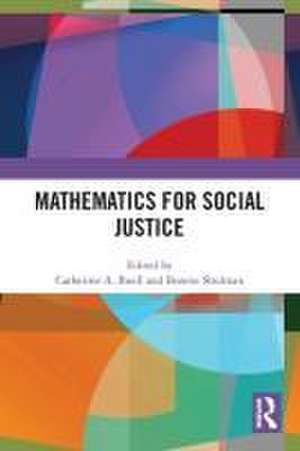Mathematics for Social Justice
Editat de Catherine A. Buell, Bonnie Shulmanen Limba Engleză Paperback – 29 ian 2024
This book contains examples of topics linking math and social justice and addresses both goals. There is a broad range of mathematics used, including statistical methods, modeling, calculus, and basic algebra. The range of social issues is also diverse, including racial injustice, mass incarceration, income inequality, and environmental justice. There are lesson plans appropriate in many contexts: service-learning courses, quantitative literacy/reasoning courses, introductory courses, and classes for math majors. What makes this book unique and timely is that the most previous curricula linking math and social justice have been treated from a humanist perspective. This book is written by mathematicians, for mathematics students. Admittedly, it can be intimidating for instructors trained in quantitative methods to venture into the arena of social dilemmas. This volume provides encouragement, support, and a treasure trove of ideas to get you started.
The chapters in this book were originally published as a special issue of the journal, PRIMUS: Problems, Resources, and Issues in Mathematics Undergraduate Studies.
| Toate formatele și edițiile | Preț | Express |
|---|---|---|
| Paperback (1) | 431.14 lei 43-57 zile | |
| CRC Press – 29 ian 2024 | 431.14 lei 43-57 zile | |
| Hardback (1) | 1000.13 lei 43-57 zile | |
| CRC Press – 18 noi 2021 | 1000.13 lei 43-57 zile |
Preț: 431.14 lei
Nou
Puncte Express: 647
Preț estimativ în valută:
82.51€ • 85.62$ • 68.96£
82.51€ • 85.62$ • 68.96£
Carte tipărită la comandă
Livrare economică 17-31 martie
Preluare comenzi: 021 569.72.76
Specificații
ISBN-13: 9781032058252
ISBN-10: 1032058250
Pagini: 228
Dimensiuni: 156 x 234 x 19 mm
Greutate: 0.34 kg
Ediția:1
Editura: CRC Press
Colecția Routledge
Locul publicării:Boca Raton, United States
ISBN-10: 1032058250
Pagini: 228
Dimensiuni: 156 x 234 x 19 mm
Greutate: 0.34 kg
Ediția:1
Editura: CRC Press
Colecția Routledge
Locul publicării:Boca Raton, United States
Public țintă
Postgraduate, Undergraduate Advanced, and Undergraduate CoreCuprins
Introduction 1 Doing Social Justice: Turning Talk into Action in a Mathematics Service Learning Course 2 Fighting Alternative Facts: Teaching Quantitative Reasoning with Social Issues 3. Measuring Income Inequality in a General Education or Calculus Mathematics Classroom 4. “There Are Different Ways You Can Be Good at Math”: Quantitative Literacy, Mathematical Modeling, and Reading the World 5. The Brokenness of Broken Windows: An Introductory Statistics Project on Race, Policing, and Criminal Justice 6. Meaningful Mathematics: A Social-Justice-Themed-Introductory Statistics Course 7. Unnatural Disasters: Two Calculus Projects for Instructors Teaching Mathematics for Social Justice 8. Supermarkets, Highways, and Natural Gas Production: Statistics and Social Justice 9. Mass Incarceration and Eviction Applications in Calculus: A First-Timer Approach 10. Math for the Benefit of Society: A New Matlab-Based Gen-Ed Course 11. Using Graph Talks to Engage Undergraduates in Conversations Around Social Justice 12. Critical Conversations on Social Justice in Undergraduate Mathematics
Notă biografică
Catherine A. Buell is Associate Professor of Mathematics. She spends her time teaching and learning from her students at Fitchburg State University, USA, and the local prison, as well as exploring the role mathematics plays in a just society. She also enjoys time with friends, the dogs, and family.
Bonnie Shulman is Professor Emerita in the Mathematics department at Bates College, Lewiston, USA. She now lives on a farm in Greene, USA, working with home-schooled youth aged 6–12 in mathematics and science.
Bonnie Shulman is Professor Emerita in the Mathematics department at Bates College, Lewiston, USA. She now lives on a farm in Greene, USA, working with home-schooled youth aged 6–12 in mathematics and science.
Descriere
This book contains examples of topics linking math and social justice and addresses both goals. There is a broad range of mathematics used, including statistical methods, modeling, calculus, and basic algebra.
